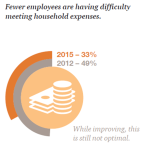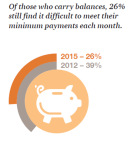
The SHRM Foundation’s latest Effective Practice Guideline, Creating a More Human Workplace Where Employees and Business Thrive, was released just in time for the SHRM Annucal conference this week. The timing couldn’t have been more appropriate, as it follows on the heels of last month’s WorkHuman conference.
If you’ve been following Data Point Tuesday for a while, you know I’m a big fan of the SHRM Foundation’s EPGs. They are researched, written, and reviewed by leading academics in the Human Resources field, and are underwritten by some of the most innovative suppliers in the HR arena. This EPG, sponsored by Globoforce, brings a great deal of data and analysis into one easily read report. In other words, it’s chock full of validated research and data on a topic that is becoming top of mind for CEOs, boards, and all C-Suite members: the connection between employee well-being and business success.
The business case for creating a more human workplace is made in the first section of the report. It includes Strategies that pay off, High costs of our current work culture, and Multiple benefits of a thriving work culture. A few of the gems from this section include:
-
The American Psychological Association estimates that workplace stress costs the U.S. economy $500 Billion (!) a year.
-
Workplace stress increases voluntary turnover by nearly 50%.
-
Gallup estimates that poor leadership associated with active worker disengagement costs the U.S. economy $450 – $550 Billion (!) per year.
-
550 Billion workdays are lost annually due to stress on the job.
-
60 – 80% of workplace accidents are attributed to stress.
The supporting data showing how detrimental most workplace cultures are to their financial success are proliferating. Even if treating employees as if they were human beings wasn’t the right thing to do, the numbers alone make it hard to understand why creating more humanity-focused cultures aren’t the leading priority for every single organization and for every single CEO!
Once past the business case, the report lays out a thorough treatment on how to fix your culture in the section, Seven Ways to Help Employees Thrive. Not rocket science, but rather simple common sense, these seven elements come with case studies, examples and specific “how tos” for you to consider in your own organization.
- Share Information About the Organization and Its Strategy
- Provide Decision-making Discretion and Autonomy
- Create a Civil Culture and Positive Relationships
- Value Diversity and Create an Inclusive Atmosphere
- Offer Performance Feedback
- Provide a Sense of Meaning
- Boost Employee Well-Being
Citing employers like Alaska Airlines, Genentech, General Mills, Ritz-Carlton, Microsoft and many others, author Christine Porath loads this EPG with practical tips, examples and evidence.
At its heart, however, humanity-focused workplaces start at the top. They start with trustworthy leadership and sustainable leadership behaviors. This graphic says it all:
This report shows, once again, that there is absolutely no downside to not only treating employees humanely, but consciously and intentionally investing in their well-being. When our employees feel respected as individuals, appreciated for their contributions, and supported in their family lives and community commitments, as well as their physical health and mental well-being, our organization missions are more likely to come to fruition and all of our stakeholders – every single one of them – will be more than happy with the return on their various investments.
Thanks to the SHRM Foundation’s newest EPG, The ROI of Working Human has never been more clear.









